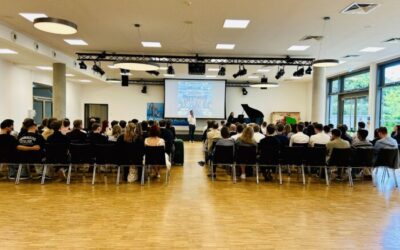
In regelmäßigen Abständen berichten an dieser Stelle Schülerinnen und Schüler unserer Berufsschule über persönliche Erfolgsgeschichten, über Erlebnisse oder Begebenheiten, die sie im Leben weitergebracht haben und wachsen ließen. Den Anfang macht heute Nick (Name von der Redaktion geändert), der von seinem Freiwilligen Sozialen Jahr (FSJ) berichtet. Sehr eindringlich – doch lesen Sie selbst:
Most people know how to interact with each outer. Everyone meets friends, classmates or family members as well as random people on the street or on the bus. But you might meet some people that have some strange behaviours. You might not even realise them but you must admit at least once or twice you meet this kind of people. I am talking about people with mental diseases. Some might be so kind and ignore them but many don´t react that kind, even though they don´t even know them they condemn them.
This is how a social year changed my perspective of this kind of people. It helped a lot working with people with mental diseases to understand how they think and why sometimes they act like that in public.
Due to the fact that many people don`t understand the problems of people with mental diseases they condemn them as stupid, insane or even aggressive due to their behaviour in public. That`s why many people keep a certain distance to those people or even react upset upon discriminate them. The problem is that people with mental diseases can´t handle their behaviour every time and this leads to hostility against them. Honestly as I was younger I wasn´t very different. I kept distance and didn´t understand why people react like that in public. Things like strange noises, weird clothing as well as some kind of we called it “Tics”.
After my graduation I had no idea what to do in life, uninspired I decided to do a social year instead of working, simply I wasn´t ready for it. The social year sounded the best way to earn some money and learn something about life. At that time I personally tried to work on my behaviour.
I made my social year at a facility of the “Internationaler Bund” in Hamburg. There I learned a lot about mental diseases, the people and their problems in daily life. This showed me the other side of the coin. I spent a year helping a group of people managing their life, like doing purchases, visiting the doctor and making administrative visits. Understanding the diseases and how to help this people surviving daily problems changed me a lot. I made many experiences. After that I understand why people with mental diseases act like that. The major problem they have is that they aren´t able to control their appear so called “tics” in German. That`s why many people react hostile maybe because they don´t understand the problems.
I learned a lot about mental diseases and about the people but what is more important is that I now know how to treat them. The best way to help is not to face them with anger or disrespect – maybe the best way is to either talk to them or ignore them if you are not familiar with the treatment. Most of the time a nice conversation helps much more then yelling at them or talking loud about their behaviour.
The important fact to know, these people have their own problems and they have much more problems solving them or even hiding them. Do them a favour and don´t make them more problems. Mental diseases vary very difficult for their owners any helping them managing their life could help them getting back into “normality”.
And last but not least I made very good experiences with the group of people I supervised, some of them even managed to live nowadays alone in their own flat without being helped doing everything. But there are still many people with this kind of problems in need of help.
After my article I hope some of you may now understand this kind of people and think twice before they talk. Don´t make them more problems, they don´t need anymore.



